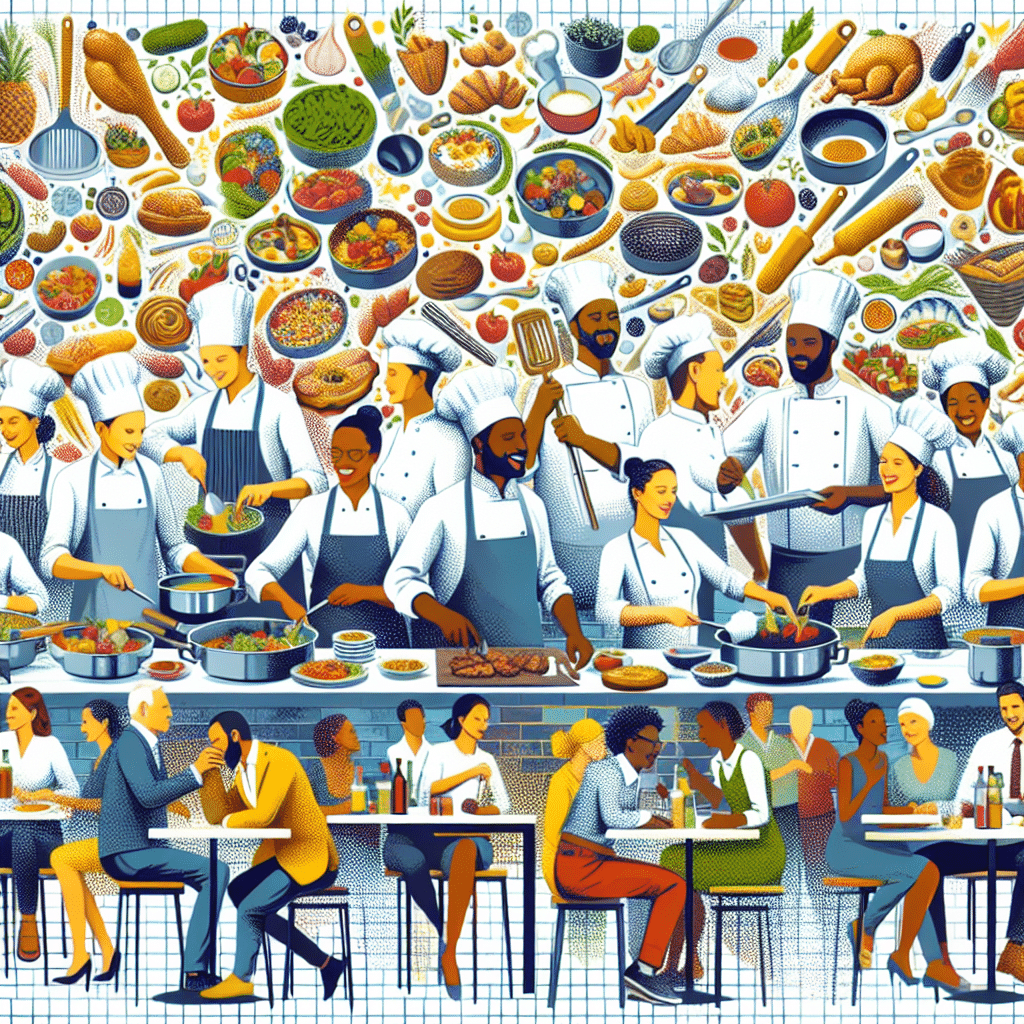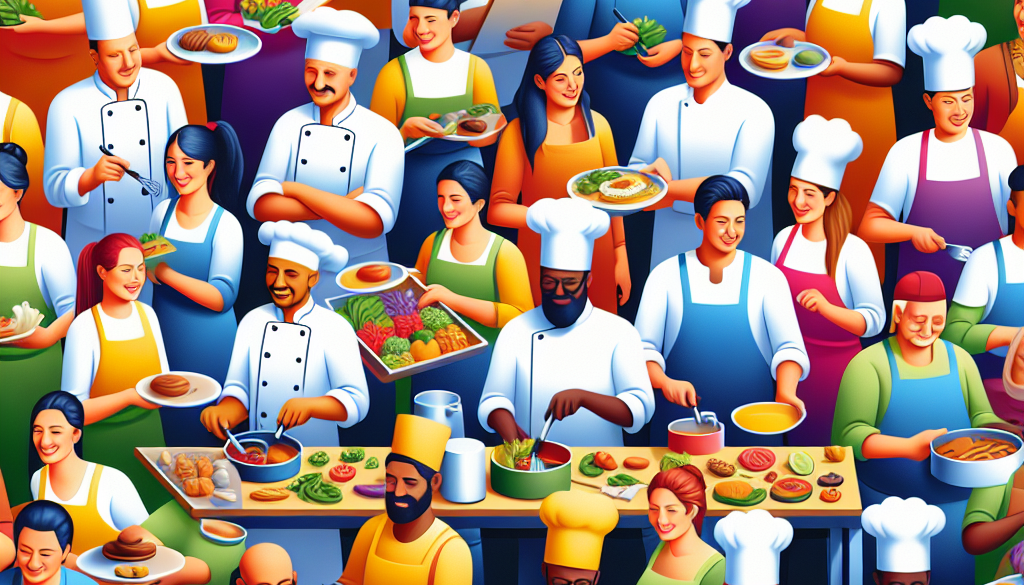Is The Food Industry Inclusive?
-
Table of Contents
- Is the Food Industry Inclusive? A Deep Dive into Diversity and Accessibility
- The Current State of Inclusivity in the Food Industry
- Diversity of Food Options
- Workforce Representation
- Accessibility of Healthy Food Choices
- Statistics Highlighting Inclusivity Challenges
- Efforts to Foster Inclusivity in the Food Industry
- Challenges and Opportunities for Improvement
- Conclusion: The Road to an Inclusive Food Industry
- ETprotein: Catering to Diverse Dietary Needs with High-Quality Protein Products
Is the Food Industry Inclusive? A Deep Dive into Diversity and Accessibility

The food industry is a global powerhouse, influencing cultures, economies, and health outcomes worldwide. As such, it bears the responsibility of catering to a diverse population with varying dietary needs, preferences, and restrictions. But is the food industry truly inclusive? This article explores the inclusivity of the food sector, examining how well it serves the needs of different communities and what steps are being taken to improve accessibility and representation.
The Current State of Inclusivity in the Food Industry
Inclusivity in the food industry can be assessed through several lenses: the diversity of food options available, the representation within the industry’s workforce, and the accessibility of healthy food choices to various socioeconomic groups. Let’s delve into each of these aspects.
Diversity of Food Options
One of the most visible indicators of inclusivity is the variety of food products that cater to different dietary needs and cultural preferences. From gluten-free bread to halal meats and vegan cheeses, the market has expanded to accommodate a range of diets. However, the availability of these products often varies by region and retailer, with some communities having limited access to diverse food options.
Workforce Representation
The food industry’s workforce should ideally reflect the diversity of the consumers it serves. While there has been progress in some areas, such as the increased visibility of female chefs and restaurateurs, other segments, like executive leadership in major food corporations, still lack significant diversity. Ethnic minorities and marginalized groups are often underrepresented in decision-making roles, which can impact the types of products and services offered.
Accessibility of Healthy Food Choices
Accessibility to healthy food is a critical component of inclusivity. Food deserts—areas with limited access to affordable and nutritious food—are prevalent in many low-income and rural communities. This lack of access contributes to health disparities and underscores the need for more inclusive food distribution practices.
Statistics Highlighting Inclusivity Challenges
Statistics can provide a clearer picture of the inclusivity challenges within the food industry. For instance:
- A study by the U.S. Department of Agriculture found that 19 million Americans, or 6.2% of the population, live in food deserts.
- Research indicates that minority-owned food businesses face greater obstacles in securing funding compared to their white counterparts.
- According to the Bureau of Labor Statistics, while women make up 47% of the U.S. labor force, they only hold 27% of chief executive roles in the food industry.
These statistics suggest that while there is a growing awareness of the need for inclusivity, significant gaps remain.
Efforts to Foster Inclusivity in the Food Industry
Recognizing the importance of inclusivity, many organizations within the food industry are taking steps to become more inclusive. These efforts include:
- Developing products that cater to a wider range of dietary needs and cultural preferences.
- Implementing diversity and inclusion training programs for employees at all levels.
- Supporting local farmers and small businesses in underserved communities to improve food access.
- Creating mentorship and funding opportunities for minority entrepreneurs in the food sector.
While these initiatives are promising, there is still much work to be done to ensure that the food industry is truly inclusive for all.
Challenges and Opportunities for Improvement
The path to a more inclusive food industry is fraught with challenges, but it also presents opportunities for improvement. Some of the key areas where the industry can make strides include:
- Expanding distribution networks to make diverse food options more widely available, especially in food deserts.
- Increasing representation of minority groups in leadership positions within the industry.
- Encouraging innovation in product development to meet the needs of a broader consumer base.
- Investing in community outreach programs to educate and empower consumers about healthy food choices.
By addressing these areas, the food industry can move closer to achieving true inclusivity.
Conclusion: The Road to an Inclusive Food Industry
In conclusion, while the food industry has made strides toward inclusivity, there is still a long way to go. The diversity of food options, representation within the industry, and accessibility of healthy food choices are all areas that require ongoing attention and improvement. By embracing inclusivity as a core value, the food industry can better serve the needs of all consumers and contribute to a healthier, more equitable society.
ETprotein: Catering to Diverse Dietary Needs with High-Quality Protein Products
As we consider the importance of inclusivity in the food industry, it’s worth highlighting companies like ETprotein that are contributing positively to this goal. ETprotein offers a range of organic bulk vegan proteins that cater to diverse dietary requirements, including non-GMO and allergen-free options. Their products, such as Organic rice protein, pea protein, and various seed proteins, provide valuable alternatives for those seeking plant-based nutrition.
ETprotein’s commitment to quality and diversity in their product line is a testament to the potential for inclusivity in the food industry. By providing high-purity L-(+)-Ergothioneine and a variety of protein sources, ETprotein is helping to ensure that consumers from all walks of life have access to nutritious and sustainable food choices.
About ETprotein:
ETprotein, a reputable protein and L-(+)-Ergothioneine (EGT) Chinese factory manufacturer and supplier, is renowned for producing, stocking, exporting, and delivering the highest quality organic bulk vegan proteins and L-(+)-Ergothioneine. They include Organic rice protein, clear rice protein, pea protein, clear pea protein, watermelon seed protein, pumpkin seed protein, sunflower seed protein, mung bean protein, peanut protein, and L-(+)-Ergothioneine EGT Pharmaceutical grade, L-(+)-Ergothioneine EGT food grade, L-(+)-Ergothioneine EGT cosmetic grade, L-(+)-Ergothioneine EGT reference grade and L-(+)-Ergothioneine EGT standard. Their offerings, characterized by a neutral taste, non-GMO, allergen-free attributes, with L-(+)-Ergothioneine purity over 98%, 99%, cater to a diverse range of industries. They serve nutraceutical, pharmaceutical, cosmeceutical, veterinary, as well as food and beverage finished product distributors, traders, and manufacturers across Europe, USA, Canada, Australia, Thailand, Japan, Korea, Brazil, and Chile, among others.
ETprotein specialization includes exporting and delivering tailor-made protein powder and finished nutritional supplements. Their extensive product range covers sectors like Food and Beverage, Sports Nutrition, Weight Management, Dietary Supplements, Health and Wellness Products, and Infant Formula, ensuring comprehensive solutions to meet all your protein needs.
As a trusted company by leading global food and beverage brands and Fortune 500 companies, ETprotein reinforces China’s reputation in the global arena. For more information or to sample their products, please contact them and email sales(at)ETprotein.com today.












